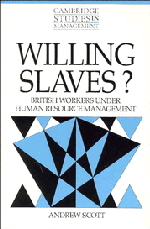Summary
Introduction
There can be little doubt that British industrial relations have changed in recent years. Two distinct attempts to explain the course of recent developments were sketched in chapter 1. The first, traditional in orientation, suggested that the recent absence of overt industrial conflict might have been little more than a temporary phenomenon, a reaction to unfavourable external conditions in which managers and workers had created an ‘alliance of insiders’. Moreover, according to this view, cooperation between managers and workers has rarely extended beyond the barest minimum necessary to avoid enterprises being bankrupted by the forces of competition. In short, beneath a thin veneer of industrial peace, managers and workers have continued to regard each other as adversaries. The second, alternative point of view, argued the possibility that innovations in management policy may have given rise to the development of a ‘new industrial relations’, in which managers and workers have learned to co-operate in the pursuit of common goals. In this more optimistic account, adversarial attitudes have been displaced by a constructive approach based upon joint problem-solving.
Beneath their obvious differences, however, the traditional and the ‘new industrial relations’ accounts share certain ideas about how and why the world has changed. Indeed, it is their common assumptions which provide the starting point for a broader understanding of contemporary developments. Both accounts reflect the belief that market forces have become increasingly powerful, and now constitute the most important influence upon workplace behaviour.
- Type
- Chapter
- Information
- Willing Slaves?British Workers under Human Resource Management, pp. 127 - 158Publisher: Cambridge University PressPrint publication year: 1994



